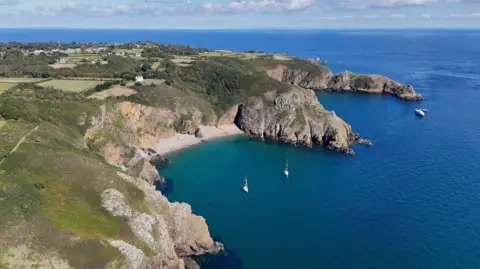Why was Sark liberated a day after Guernsey?
 BBC
BBCJersey and Guernsey have marked the 80th anniversary of their liberation from German forces during World War Two, with commemorations in Sark set to begin later.
Those islands were occupied from 1940 until 9 May 1945, but Sark was not liberated until the following day.
Although the liberation of Sark took place a day later on May 10, it actually happened earlier than planned due to "reports of unrest" in the island, said history podcaster and blogger Nick Le Huray.
He said there were "a number of stories" as to what prompted liberation, which was known as Operation Marble, including that German forces had set fire to buildings and phones went unanswered.
Fire confusion
Mr Le Huray, who has written a book on the occupation, said some of his family were living in the island at the time.
It was a relatively small number of men who arrived in Guernsey on 9 May to liberate the island, he said.
"They were concentrating on getting the island secure and therefore Sark was on the list to deal with later because it was a much smaller garrison," he said.
"There are a number of stories as to what happened, one of which is that there was a fire on Sark.
"They say smoke was spotted by the forces in Guernsey and they sent some men to investigate as they were worried that the German forces had set fire to buildings."
At the same time a celebratory bonfire was taking place in Sark, he said.

Mr Le Huray said there were also "incredible reports" German in Sark were not answering phones.
"There were attempts made to contact them to see what was going on and they just ignored it," he said.
"I think that, combined with the worry something was going on because of smoke coming from a celebratory bonfire, led to a party of 20-odd men being sent over.
"It was still an early liberation, they wanted to secure Guernsey and Jersey first, hence why Alderney didn't get liberated until the 16 May."
The Dame of Sark, Sibyl Hathaway, acted as the main contact between the residents and the German authorities during Occupation.
Dame Sibyl served as the Dame from 1927 until her death in 1974, overseeing the island for 47 years during the reigns of four British monarchs.
"She acted as interpreter for the British with the Germans because she could speak German," Mr Le Huray said.
The German surrender was not signed at La Seigneurie, the traditional residence of the Seigneur of Sark, but instead at Rose Cottage where the German Kommandantur was based.
 Nick Le Huray
Nick Le HurayIn her autobiography, Dame Sibyl said she took the British troops on 10 May to Rose Cottage where a German Kommandant was summoned to answer questions and carry out "whatever orders" she gave while the liberation force temporarily returned to strengthen Guernsey.
"Having translated this command, I promptly gave my first order to the German major," she wrote.
"You will see to it that the telephone is laid on at once to my house and kept open day and night so that I can contact Guernsey.
"Our Liberation Force boarded the tug and I was left in command of 275 German troops."
Follow BBC Guernsey on X and Facebook. Send your story ideas to [email protected].
